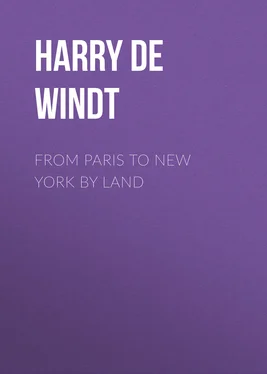Harry De Windt - From Paris to New York by Land
Здесь есть возможность читать онлайн «Harry De Windt - From Paris to New York by Land» — ознакомительный отрывок электронной книги совершенно бесплатно, а после прочтения отрывка купить полную версию. В некоторых случаях можно слушать аудио, скачать через торрент в формате fb2 и присутствует краткое содержание. Жанр: foreign_prose, foreign_antique, на английском языке. Описание произведения, (предисловие) а так же отзывы посетителей доступны на портале библиотеки ЛибКат.
- Название:From Paris to New York by Land
- Автор:
- Жанр:
- Год:неизвестен
- ISBN:нет данных
- Рейтинг книги:4 / 5. Голосов: 1
-
Избранное:Добавить в избранное
- Отзывы:
-
Ваша оценка:
- 80
- 1
- 2
- 3
- 4
- 5
From Paris to New York by Land: краткое содержание, описание и аннотация
Предлагаем к чтению аннотацию, описание, краткое содержание или предисловие (зависит от того, что написал сам автор книги «From Paris to New York by Land»). Если вы не нашли необходимую информацию о книге — напишите в комментариях, мы постараемся отыскать её.
From Paris to New York by Land — читать онлайн ознакомительный отрывок
Ниже представлен текст книги, разбитый по страницам. Система сохранения места последней прочитанной страницы, позволяет с удобством читать онлайн бесплатно книгу «From Paris to New York by Land», без необходимости каждый раз заново искать на чём Вы остановились. Поставьте закладку, и сможете в любой момент перейти на страницу, на которой закончили чтение.
Интервал:
Закладка:
Paris is my home, and I am not ashamed to own that, like most Parisians, I suffer, when abroad, from a nostalgia of the Boulevards that a traveller were perhaps better without. It was therefore as well that our departure for New York took place on a dreary December day, when the beautiful city lay listless and despondent, swept by a wintry gale and lashed by gusts of driving sleet. The sky was sunless, the deserted thoroughfares rivers of mud mournfully reflecting bars of electric light from either side of the street. As my cab splashed wearily up the Rue Lafayette I thought that I had never seen such a picture of desolation. And yet it were better, perhaps, to remember Paris thus, than to yearn through the long Arctic night for the pleasant hours I had learned to love so well here in leafy June. Bright days of sunshine and pleasure in and around the "Ville Lumière!" cool, starlit nights at Armenonville and Saint Cloud! Should I ever enjoy them again?
"The De Windt Expedition" left Paris on December 19, 1901. Preliminary notices of the journey in the French Press had attracted considerable notice in Paris, and a small crowd of journalists and others had assembled at the Gare du Nord to wish us God-speed. We were three in number—myself, the Vicomte de Clinchamp (a young Frenchman who acted as photographer), and George Harding, my faithful companion on many previous expeditions. The "Nord Express" was on the point of departure, but a stirrup-cup was insisted upon by some of De Clinchamp's enthusiastic compatriots, and an adjournment was made to the Buffet, where good wishes were expressed for our safety and success. After a hearty farewell the train steamed out of the station amidst ringing cheers, which plainly told me that Paris as well as London contained true friends who would pray for our welfare in the frozen North and welcome our safe return to "La Belle France."
Moscow was reached three days later, and here commenced the first of a series of minor but harassing delays which relentlessly pursued me throughout the Asiatic portion of the journey. While alighting from the train I was suddenly seized with such severe internal pains, accompanied by faintness and nausea, that on arrival at the Slaviansky Bazar (the best Hotel, by the way, in the place), I was carried to bed. The attack was inexplicable. Harding, ever a pessimist, suggested appendicitis, and a physician was hastily summoned. The medicine-man gravely shook his head: "You are very ill," he said, and I did not dispute the fact. "Can it be appendicitis?" I asked anxiously. "Appendicitis," replied the Doctor; "what is that? I never heard of the disease!"
Morning brought me some relief, and with a not unnatural distrust of Russian medical methods, I resolved to return at once to Berlin and consult Professor Bergmann. To abandon the journey was now out of the question, but our medicine-chest was up-to-date and I could at any rate ask the famous surgeon how to treat the dread disease should it declare itself in the wilds of Siberia. The next morning saw me back in Berlin, and by midday my mind was at rest. I was suffering from a simple rupture of long standing, but hitherto quiescent, which only required rest and proper treatment for at least a fortnight. "Then it must be in the train," I said, explaining the situation and the priceless value of time. So, after some discussion, I departed with the Professor's good wishes, which, however, were conveyed with an ominous shake of the head.
Two days later I arrived in Moscow, only to be confronted by another difficulty: our rifles, revolvers and ammunition had been seized at the Russian frontier, and at least a fortnight must elapse before we could obtain them. Moscow fortunately boasts of an excellent gun-maker, and I was able to replace our armoury with English weapons, though, of course, at a ruinous expense. But time was too precious to waste. We had now but a little over four months in which to reach Bering Straits, for by the middle of May the bays and estuaries of the Arctic begin to break up, and open water might mean imprisonment (and worse) on these desolate shores throughout the entire summer. So I purchased revolvers, two rifles and a fowling-piece at about five times their usual cost, and hoped that our troubles were over, at least for the present. I should add that the arms had left London six weeks previously, and that I was furnished with a special permit to introduce them into the country. But Russian methods are peculiar, and fortunately unique, I was unaware before our departure of the fact that if a gun is consigned direct from its English maker to a gunsmith in Russia it goes through without any trouble whatsoever. Otherwise, it may take six months or more to reach its destination.
The New Year was passed in Moscow, and a gloomy one it was. From an historical and picturesque point of view the city is intensely interesting, but otherwise it is a dull, dreary place. Russian cities, not excepting Petersburg, generally are, although the English novelist generally depicts them as oases of luxurious splendour, where love and Nihilism meet one at every turn, and where palaces, diamonds and silver sleigh-bells play an important part, to say nothing of that journalistic trump card, the Secret Police! I wish one of these imaginative scribes could spend a winter evening (as I have so often done) in a stuffy hotel reading-room, with a Times five days old, wondering whether the Russians will ever provide a theatre sufficiently attractive to tempt a stranger out of doors after nightfall. In summer it is less dismal; there are gardens and restaurants, dancing gipsies and Hungarian Tziganes, but even then the entertainment is generally so poor, and the surroundings so tawdry, that one is glad to leave them at an early hour and go sadly to bed.
The distance from Moscow to Irkutsk is a little under 4000 English miles, the first-class fare a little over a hundred roubles (or about £12), which, considering the journey occupies nine days or more, is reasonable enough. There are, or were, two trains a week,—the "State" and Wagonlits expresses, which run alternately. The former is a Government train, inferior in every respect to the latter, which is quite as luxurious in its service and appointments as the trains run by the same company in Europe.
Читать дальшеИнтервал:
Закладка:
Похожие книги на «From Paris to New York by Land»
Представляем Вашему вниманию похожие книги на «From Paris to New York by Land» списком для выбора. Мы отобрали схожую по названию и смыслу литературу в надежде предоставить читателям больше вариантов отыскать новые, интересные, ещё непрочитанные произведения.
Обсуждение, отзывы о книге «From Paris to New York by Land» и просто собственные мнения читателей. Оставьте ваши комментарии, напишите, что Вы думаете о произведении, его смысле или главных героях. Укажите что конкретно понравилось, а что нет, и почему Вы так считаете.












